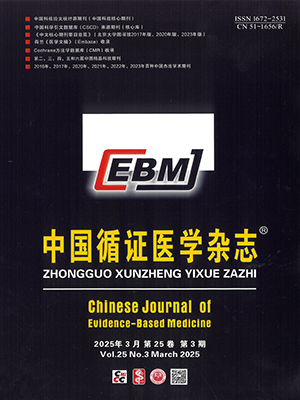| 1. |
Bray F, Ferlay J, Soerjomataram I, et al. Global cancer statistics 2018: GLOBOCAN estimates of incidence and mortality worldwide for 36 cancers in 185 countries. CA Cancer J Clin, 2018, 68(6): 394-424.
|
| 2. |
Institute of Medicine (US). Committee on Standards for Developing Trustworthy Clinical Practice Guidelines, Clinical practice guidelines we can trust. Washington: National Academies Press, 2011.
|
| 3. |
Qaseem A, Forland F, Macbeth F, et al. Guidelines International Network: toward international standards for clinical practice guidelines. Ann Intern Med, 2012, 156(7): 525-531.
|
| 4. |
Moher D, Schulz KF, Simera I, et al. Guidance for developers of health research reporting guidelines. PLoS Med, 2010, 7(2): e1000217.
|
| 5. |
AGREE Collaboration. Development and validation of an international appraisal instrument for assessing the quality of clinical practice guidelines: the AGREE project. Qual Saf Health Care, 2003, 12(1): 18-23.
|
| 6. |
Brouwers MC, Kho ME, Browman GP, et al. AGREE Ⅱ: advancing guideline development, reporting, and evaluation in health care. Prev Med, 2010, 51(5): 421-424.
|
| 7. |
Chen Y, Yang K, Marušić A, et al. A reporting tool for practice guidelines in health care: the RIGHT statement. Z Evid Fortbild Qual Gesundhwes, 2017, 127-128: 3-10.
|
| 8. |
Cancer Control Alberta. Management of patients with early esophageal cancer, dysplastic and non-dysplastic Barrett's esophagus. 2014. Available from: https://www.guidelinecentral.com/summaries/management-of-patients-with-early-esophageal-cancer-dysplastic-and-non-dysplastic-barretts-esophagus/.
|
| 9. |
Ajani JA, D'Amico TA, Bentrem DJ, et al. Esophageal and esophagogastric junction cancers (Version 2.2019), NCCN clinical practice guidelines in oncology. J Natl Compr Canc Netw, 2019, 17(7): 855-883.
|
| 10. |
Evans JA, Early DS, et al. ASGE Standards of Practice Committee. The role of endoscopy in the assessment and treatment of esophageal cancer. Gastrointest Endosc, 2013, 77(3): 328-334.
|
| 11. |
Varghese TK Jr, Hofstetter WL, Rizk NP, et al. The Society of Thoracic Surgeons guidelines on the diagnosis and staging of patients with esophageal cancer. Ann Thorac Surg, 2013, 96(1): 346-356.
|
| 12. |
Gaspar LE, Nag S, Herskovic A, et al. Clinical Research Committee, American Brachytherapy Society, American Brachytherapy Society (ABS) consensus guidelines for brachytherapy of esophageal cancer. Int J Radiat Oncol Biol Phys, 1997, 38(1): 127-132.
|
| 13. |
毛友生, 杨丁, 高树庚, 等. 胸段食管癌手术入路选择争议与共识. 中华胃肠外科杂志, 2016, 19(9): 961-964.
|
| 14. |
Whiteman DC, Appleyard M, Bahin FF, et al. Australian clinical practice guidelines for the diagnosis and management of Barrett's esophagus and early esophageal adenocarcinoma. J Gastroenterol Hepatol, 2015, 30(5): 804-820.
|
| 15. |
Palmes D, Br wer M, Bader FG, et al. Diagnostic evaluation, surgical technique, and perioperative management after esophagectomy: consensus statement of the German Advanced Surgical Treatment Study Group. Langenbecks Arch Surg, 2011, 396(6): 857-866.
|
| 16. |
Stahl M, Oliveira J. Esophageal cancer: ESMO clinical recommendations for diagnosis, treatment and follow-up. Ann Oncol, 2009, 20(Suppl 4): 32-33.
|
| 17. |
Wong R, Walker-Dilks C, Raifu A. Evidence-based guideline recommendations on the use of positron emission tomography imaging in oesophageal cancer. Clin Oncol (R Coll Radiol), 2012, 24(2): 86-104.
|
| 18. |
Kuwano H, Nishimura Y, Oyama T, et al. Guidelines for diagnosis and treatment of carcinoma of the esophagus April 2012 edited by the Japan Esophageal Society. Esophagus, 2015, 12(1): 1-30.
|
| 19. |
Allum WH, Blazeby JM, Griffin SM, et al. Guidelines for the management of oesophageal and gastric cancer. Gut, 2011, 60(11): 1449-1472.
|
| 20. |
Malthaner RA, Wong RK, Rumble RB, et al. Neoadjuvant or adjuvant therapy for resectable esophageal cancer: a clinical practice guideline. BMC Cancer, 2004, 4: 67.
|
| 21. |
Jo Y. New consensus on the management of barrett's dysplasia and early stage esophageal adenocarcinoma: limited evidence, but best available guidance. J Neurogastroenterol Motil, 2012, 18(4): 455-456.
|
| 22. |
Lordick F, Mariette C, Haustermans K, et al. Oesophageal cancer: ESMO clinical practice guidelines for diagnosis, treatment and follow-up. Ann Oncol, 2016, 27(suppl 5): v50-v57.
|
| 23. |
Malthaner R, Wong RK, Spithoff K, et al. Preoperative or postoperative therapy for resectable oesophageal cancer: an updated practice guideline. Clin Oncol (R Coll Radiol), 2010, 22(4): 250-256.
|
| 24. |
Martin-Richard M, DSaz Beveridge R, Arrazubi V, et al. SEOM clinical guideline for the diagnosis and treatment of esophageal cancer (2016). Clin Transl Oncol, 2016, 18(12): 1179-1186.
|
| 25. |
Gallego J, Cervantes A, Pericay C, et al. SEOM clinical guidelines for the treatment of oesophageal cancer. Clin Transl Oncol, 2011, 13(8): 520-524.
|
| 26. |
王雅棣, 路娜. 食管癌三维适形/调强放疗剂量与范围的共识与争议. 世界华人消化杂志, 2016, 24(34): 4531-4536.
|
| 27. |
中国医师协会胸外科分会快速康复专家委员会. 食管癌加速康复外科技术应用专家共识(2016版). 中华胸心血管外科杂志, 2016, 32(12): 717-722.
|
| 28. |
吕家华, 李涛, 谢丛华, 等. 食管癌放疗患者肠内营养专家共识. 肿瘤代谢与营养电子杂志, 2015, 2(4): 29-32.
|
| 29. |
李苏宜. 食管癌和贲门癌肿瘤内科诊治指南. 江苏省抗癌协会化疗专业委员会第五届年会暨肺癌专题研讨会论文集, 南京: 2004, 66-76.
|
| 30. |
Allum WH, Blazeby JM, Griffin SM, et al. Association of upper gastrointestinal surgeons of Great Britain and Ireland, the British Society of Gastroenterology and the British Association of Surgical Oncology. Guidelines for the management of oesophageal and gastric cancer. Gut, 2011, 60(11): 1449-1472.
|
| 31. |
于振涛. 食管胃交界腺癌手术治疗共识与争议. 中华胸部外科电子杂志, 2015, 2(1): 3-7.
|
| 32. |
中华医学会消化内镜学分会中国抗癌协会肿瘤内镜专业委员会. 中国早期食管癌筛查及内镜诊治专家共识意见精简版(2014年, 北京). 中华消化杂志, 2015, 35(5): 294-299.
|
| 33. |
中华医学会消化内镜学分会消化系早癌内镜诊断与治疗协作组, 中华医学会消化病学分会消化道肿瘤协作组, 中华医学会消化病学分会消化病理学组. 中国早期食管鳞状细胞癌及癌前病变筛查与诊治共识(2015年, 北京). 中华消化内镜杂志, 2016, (1): 3-18.
|
| 34. |
World Health Organization. Guidelines for WHO guidelines. 2003. Available from: https://apps.who.int/iris/bitstr eam/handle/ 10665/68925/EIP_GPE_EQC_2003_1.pdf;sequence=1.
|




